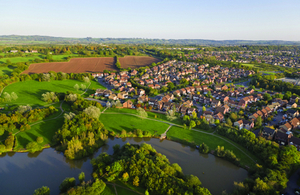Community
In very general terms, the word ‘community’ refers to a group of people who live in same location, often sharing housing, amenities, services, infrastructure, and so on. They may have shared interests in how their local area is managed, developed, regenerated, conserved, and so on. Communities can range from the very small scale social units, relating to a single building, up to the city, national or even global scale.
The term can also be used in a wider sense to refer to people with shared interests or professional status, such as, an ‘engineering community’ or ‘building community’.
The word 'community' is derived from the Latin 'communis', meaning 'shared in common'
Engaging with the local community is of growing importance within the planning system. The Coalition Government created the Localism Act which made public consultation a statutory requirement for specific schemes of a certain size, or specific organisations. For more information, see Consultation process.
A community liaison officer (CLO), sometimes referred to as a local liaison officer, communicates and coordinates activities between an organisation and a community. Typically, this might be required where an organisation such as a property developer has a significant interaction with the general public. For more information, see Community liaison officer.
Developers are increasingly attempting to create new communities rather than simply buildings, through techniques such as placemaking.
Section 18 of the Planning and Compulsory Purchase Act 2004 introduced a requirement for local planning authorities to prepare a statement of community involvement (SCI). The SCI sets out the authority’s engagement strategy for the planned involvement of the local community in the preparation and review of development plan documents and in consultation on planning applications. For more information, see Statement of community involvement.
The Localism Act 2011 also brought in a range of new rights for communities and neighbourhood groups. These community rights included:
- Community Right to Bid.
- Community Right to Challenge.
- Community Right to Build.
- Community Right to Reclaim Land.
- Right to Contest.
- New neighbourhood planning measures.
- The Our Place programme.
- Community shares initiative.
- Tenant empowerment programme.
- Right to Transfer.
Community-led housing is a means by which local communities can play a central role in providing their own housing. This can be used to specifically help certain groups such as older people. The general concept behind community-led housing is that the housing can be rented to people who live in the local community at affordable rates. For more information, see Community-led housing.
The Community infrastructure levy (CIL) is a charge that local authorities can choose to impose on new developments to fund local infrastructure. For more information, see Community infrastructure levy.
Community energy networks have become a popular means by which local communities can take collective action to reduce energy consumption by taking collective action to improve buildings, use collective purchase purchasing or switching power to get a better deal, and so on. For more information, see Community energy network.
Designing Buildings Wiki has a range of other articles relating to communities, including:
- Cohousing.
- Community engagement in conservation.
- Community housing fund.
- The Community Infrastructure Levy (Amendment) Regulations 2014.
- Community infrastructure levy commencement notice.
- Consultation.
- Development plan.
- Housing cooperative.
- HS2 and community projects.
- Intentional community.
- Local development scheme.
- Local plan.
- Neighbourhood planning.
- Nimbyism.
- Sites of community importance.
- Tenant management organisation.
NB The GEN Glossary, published by the Global Ecovillage Network, [accessed 24/20/2022], suggests that: ‘The word “community” comes from the Latin “communis”, which means “shared in common” and typically refers to:
- ‘A group of people living in the same place
- ‘A group of people sharing certain attitudes and interests’
Engagement Overlay to the RIBA Plan of Work, published by the RIBA in January 2024, states: ‘A community is a group with shared characteristics such as geography, time (past, current, and future), attitude, culture, identity, or interests. However, a community is not a homogenous group; people will likely belong to more than one identifying community. Communities may not be static and have different meanings to different people, and engaging with a community requires acknowledging and respecting this diversity.’
[edit] Related articles on Designing Buildings
- City.
- Communities of practice.
- Community facilities.
- Community of place.
- Hamlet.
- Lifetime neighbourhoods.
- Local authority.
- Localism Act.
- Local development order.
- Local needs analysis.
- Location.
- National Planning Policy Framework.
- Public.
- Resilient infrastructure diversity and equity scorecard.
- Society.
- Town planning.
- Village.
Featured articles and news
Infrastructure that connect the physical and digital domains.
Harnessing robotics and AI in challenging environments
The key to nuclear decommissioning and fusion engineering.
BSRIA announces Lisa Ashworth as new CEO
Tasked with furthering BSRIA’s impressive growth ambitions.
Public buildings get half a million energy efficiency boost
£557 million to switch to cleaner heating and save on energy.
CIOB launches pre-election manifesto
Outlining potential future policies for the next government.
Grenfell Tower Inquiry announcement
Phase 2 hearings come to a close and the final report due in September.
Progress from Parts L, F and O: A whitepaper, one year on.
A replicated study to understand the opinion of practitioners.
ECA announces new president 2024
Electrical engineer and business leader Stuart Smith.
A distinct type of countryside that should be celebrated.
Should Part O be extended to existing buildings?
EAC brands heatwave adaptation a missed opportunity.
Definition of Statutory in workplace and facilities management
Established by IWFM, BESA, CIBSE and BSRIA.
Tackling the transition from traditional heating systems
59% lack the necessary information and confidence to switch.
The general election and the construction industry
As PM, Rishi Sunak announces July 4 date for an election.
Eco apprenticeships continue help grow green workforce
A year after being recognised at the King's coronation.
Permitted development rights for agricultural buildings
The changes coming into effect as of May 21, 2024.























Comments